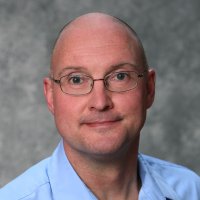
Title
ProfessorOffice Building
Avera Health and Science CenterOffice
351Mailing Address
Avera Health & Science 351Chemistry, Biochem & Physics-Box 2202
University Station
Brookings, SD 57007
CV
Miller-CV.pdf(63.81 KB)Academic Interests
- Chemistry Education
Academic Responsibilities
My undergraduate instructional responsibilities include teaching CHEM 115 (General Chemistry I for chemistry majors and honors students) and CHEM 232 (General Chemistry II for chemistry majors and honors students), team teaching of SEED 413 (7-12 Science Methods). At the graduate level I have taught courses in support of the new Master of Science in chemistry for chemistry teachers. These courses include CHEM 610 (Atomic Theory and Bonding), 613 (Equilibria and Acid-Base Chemistry), 614 (Kinetics, Nuclear and Electrochemistry), 616 (Laboratory Development), 617 (Action Research in the Secondary Classroom), 618 (Chemistry Teaching Strategies), and 788 (Problem-Based Classroom Application). Finally, as part of the chemical education Ph.D. program I have taught CHEM 713 (Qualitative Chemistry Research Methods), 714 (Quantitative Chemistry Research Methods) and 715 (Chemistry Instruction in Higher Education).
Areas of Research
My research expertise involves work on education activities with direct impact on chemistry. Concern has been expressed about the number of American students that acquire undergraduate and graduate degrees in chemistry. It is my premise that the to increase the number of American students the instruction at American primary and secondary schools must be enhanced. Therefore the focus of my work is on the improvement of educational opportunities for secondary science teachers and students interested in becoming secondary teachers. Current projects to attain this goal include the Northern Plains Institute for Science and Mathematics Education, Masters of Science in chemistry for secondary teachers, realignment of the undergraduate curriculum to enhance research involvement of chemistry majors and collaborative activities with departmental researchers in environmental activities.
The Northern Plains Institute for Science and Mathematics Education (NPISME) is a collaborative activity with SDSU faculty in biology, education, mathematics and physics. This collaboration is a result of the formation of the SDSU Science and Math Teacher Imperative (SMTI). Our goal is to create the NPISME: an institute that will work to enhance the involvement of primary and secondary students in science education activities. These activities will have the ultimate goal of increasing the number of students interested in educational careers in science.
The Masters in Science for secondary teachers is a program developed to support chemistry teachers currently working in the secondary schools and enhance their knowledge in chemistry. Currently 11 teachers are involved in the program. Teachers are engaged throughout the year in content-based courses then spend time during the summer working in SDSU research laboratories. By providing this opportunity of current teachers instruction at secondary schools will be enhanced resulting in more prepared and more interested undergraduate students, particularly in chemistry.
Once undergraduate students are on campus it is our responsibility to provide them with a program that continues to spark interest in chemistry. The department has decided to alter its first two years of the undergraduate curriculum for this purpose. We are currently in the initial stages of this reformation. Lecture courses will be no longer be strictly general chemistry followed by organic but will be a blended curriculum to provide a more coherent story about chemistry. The laboratory courses will be restructured to promote creative thinking in the laboratory to promote student interest in future work in the research laboratories.
Finally I have been involved in collaborative activities with several department faculty members. As part of a NSF grant a project designed to include secondary teachers and students in activities to collect and analyze water samples using new departmental instrumentation is currently underway. This project will help secondary teachers and students, along with the undergraduate and graduate students that will help to analyze samples, be exposed to exciting new instrumental methods used in chemistry. A second collaboration will involve the implementation of green chemistry concepts in secondary education to identify the impact of these ideas on teacher and students perceptions.

